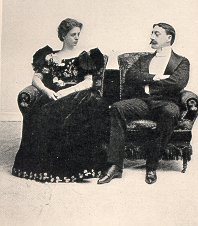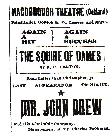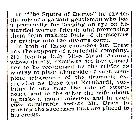
The Squire of Dames
The play opened on January 20, 1896, Palmer's Theater, and ended up running for 88 performances.
=====From the Acton Davies book=====
"The run of Christopher,Jr, at the Empire lasted until the following February, when Mr. Drew moved to the Garrick and presented an adaptation by R. C. Carton of Dumas fils' 'L'Ami des Femmes."
"In its English dress it was known as The Squire of Dames. There was a very effective part for Mr. Drew in it, but Miss Adams, cast for the role of a rather flippant and heartless young society matron, came as close to scoring a failure as she ever did in her life. It was not her fault; she was miscast, that was all, and all the women theatergoers, with whom Maude Adams had already become a mania of the first water, laid the entire blame for the tiny fiasco upon a dress which Miss Adams wore in the principal scene. Poor luckless frock! How the fashion writers and women's departments did tear that unfortunate garment to pieces ! Miss Adams has since laughingly explained that she never could understand what there was about the gown to call forth such a volley of onslaughts, but, as a matter of fact., the women who went there to dote and gloat over their favorite actress were disappointed at not finding her in as good a role as usual, and, consequently,, their sense of justice and loyalty not permitting them to "roast " the actress, they had relieved their feelings by taking away the character of her frock."
=====My Years on the Stage by John Drew; E. P. Dutton & Company, 1922=====
We did an English version of L'Ami des Femmes by Dumas Fils. The adaptation was called The Squire of. Dames and was made by R. C. Carton, the author of Lord and Lady Algy, Lady Huntworth's Experiment and many other successful plays
=====American Theatre: A Chronicle of Comedy and Drama, 1869-1914 by Gerald Bordman; Oxford University Press, 1994=====
Similarly, R. C. Carton's adaptation of his L'Ami des femmes as The Squire of Dames ( 1-20- 96), Palmer's) had been offered to London shortly before the playwright died. But the lack of announcements in American papers suggest that the producer, Charles Frohman, only became interested in importing it after columns of eulogies had filled theatrical sections. Having decided to do it, though, he gave it his best shot. John Drew was staffed--his third starring role of the season--and many of the players regularly associated with him were reenlisted in support: Maude Adams, Arthur Byron, Ferdinand Gottschalk, and Annie Irish. The slightly watered down story told of a capricious, rebellious wife who leaves an erring husband for a doltish lover. It takes the sometimes subtle, always sensible counsels of a blas, no-longer-young man of the world to bring about a curtain-time reconciliation. Drew and the increasingly admired Miss Adams won the most laurels, and the play ran, with a slight interruption, for three months.
Reviews
A January 21, 1896 review goes:
"Miss Adam's quiet words came with force, her fears and grief and quick, amazed recovery of hope were triumphs of emotional expression.
“Miss Maud Adams was eminently satisfying in the role.”
New York Sun, 21 Jan. 1896: “Miss Adam's conception of this character was marvelously delicate, and at moments not less strong and moving. Her quiet words came with strange force; her fears and grief and quick, amazed recovery of hope were triumphs of emotional expression, not the less perfect because in them was no element of a greatness that was unnecessary and which might have been out of place.” The World, Jan. 21, 1896
“It is doubtful if any other actress of the present hour could play Dolly so sweetly or naturally as Maude Adams.” New York Times, Sept. 1, 1896

 The Oakland Tribue, July 10, 1896 |
 The Oakland Tribune, March 20, 1896 |
Note that the play advertisement on the left does not even mention Maude Adams, just Mr. Drew's "Admirable Company." The second article does talk about "Maud" Adams in a very positive form.
|